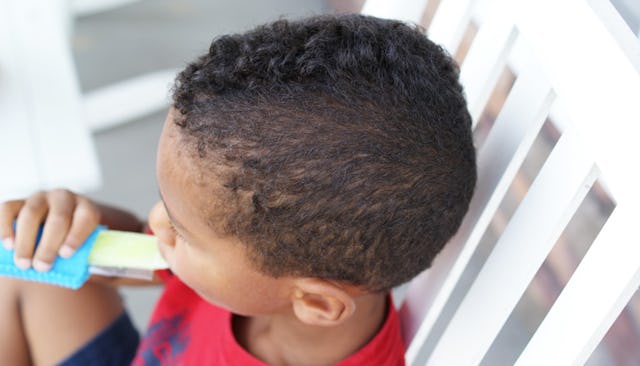Please Don't Touch My Black Child's Hair To Satisfy Your Curiosity

Dear Woman at the Shoe Store,
You probably don’t remember me. Our paths crossed while vacationing at the beach a few weeks ago, in a shoe store where my family stopped so that my mom could look for flip-flops. My 5-year-old raced to the back of the store, on the hunt for shoes for himself (which he didn’t need), and you pointed us in the right direction. We chatted for a moment and you asked my son what grade he would be in this fall, and then you touched him on the head.
If it wasn’t for that touch on the head, I probably would have forgotten all about our encounter, but you touched his hair for quite a long time. Minutes it felt like, although it was probably only a few seconds. I watched the way you fingered his curls, feeling his hair, running your hand through his little mohawk (or his “monkey-hawk,” as he calls it).
I watched, frozen, wanting to say something—to tell you to stop—as practiced phrases ran through my mind, but I was unable to speak any of them out loud. My need to be nice, to avoid confrontation and awkward moments, overruled speaking up for my son.
I was that white mom in the shoe store with her black son, and these moments have happened to us before. A pat on the head that my momma-gut tells me is not just friendly affection but also about curiosity: What does his hair feel like? Usually people are more subtle than you were. But always I find a wave of protectiveness crashing through me—even if I don’t act on it.
I want to protect my child from being the object of people’s curiosity. I want to protect him from feeling “other” when he is the black child in predominantly white spaces. I want to protect him from the message that his boundaries do not matter.
I want to protect him from racial microaggressions, those encounters where well-meaning white people, without meaning to or realizing it, do things that demean or insult a person of color, repeat stereotypes, or make a person—make my child—feel “other.”
I chewed on our brief encounter for days, long after we had returned home from vacation and I’m sure you had forgotten all about it. I talked to my husband and my family and other parents in mixed-race families. I reached out to black and brown friends to ask if this has happened to their kids. I messaged a friend, whose white daughter has a gorgeous head full of ringlets, to ask if people touch her hair.
I wanted to know if I was right to see this as a race issue. I wanted to understand why, exactly, I was so upset (besides my disappointment in myself for not speaking up).
I realize that you probably didn’t think twice about touching my son’s hair or what it might mean to me and (someday) to him. Black folks, a black friend told me, rarely touch others’ hair. There is a respect, a sense of the cultural significance, an understanding of the time and effort (and love) that is often involved in caring for black hair. White people, most of whom aren’t knowledgeable about that culture or history (and haven’t taken the time to learn), don’t know this. That is probably why it’s always white people who feel up my child’s head.
I understand your curiosity. But I also want you to know that it’s not okay to invade my son’s space to satisfy your own curiosity. Sometimes our curiosity doesn’t get satisfied. We’re not entitled to that satisfaction, especially when it means disregarding someone else’s rights and space in the process.
For now that is what I am teaching him: His body belongs to him. It isn’t appropriate for strangers to touch him. He has the right to speak up if someone makes him uncomfortable. My son is too young for me to frame this as a race issue when we talk about it, but I am laying the groundwork for him to understand what lines shouldn’t be crossed.
Would you have run your fingers through my son’s hair if I wasn’t white? Or if he had been with his dad, a black man? Please know that my whiteness doesn’t give you an “in.”
I don’t want to be the mom whose hackles raise at every question, every curiosity, every misstep, assuming the worst. I know we are all fumbling through this race-conscious world together. I want my boys to be empowered and assertive, understanding and laid back, all at the same time, and I need to figure out how to model this for them.
If your curiosity is genuine and authentic—if you want to better understand my family or caring for black hair—I’d be happy to talk, although not in front of my 5-year-old, who already seems acutely aware of being black in predominantly white spaces…like that shoe store at the beach. But I do understand that dialogue and questions are how we are going to grow and move forward together, and I owe it to my kids to help make that happen.
This article was originally published on